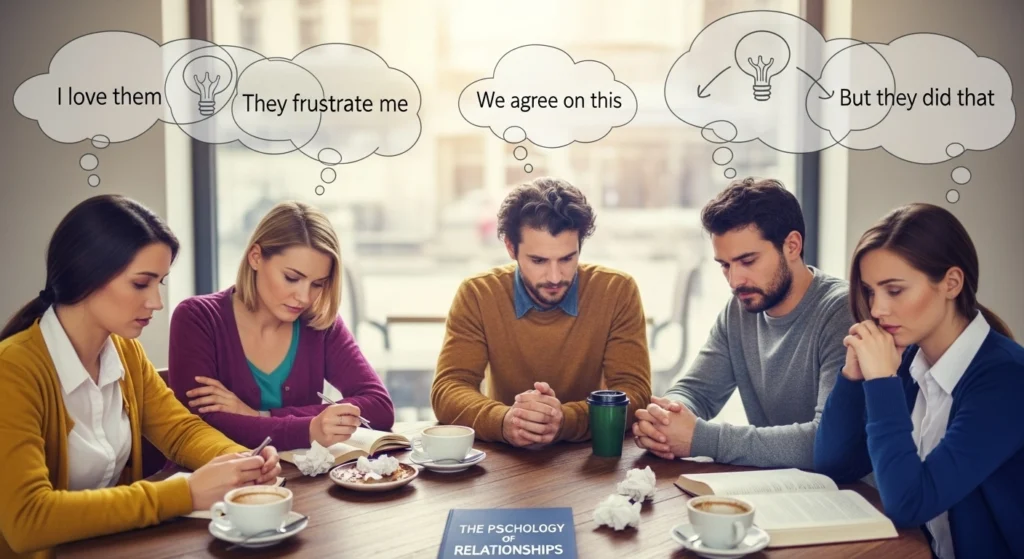Cognitive dissonance is a fancy way of saying you feel uncomfortable when your actions and your beliefs don’t match. In relationships, this can happen when you care about someone but their behavior goes against your values. I’ve seen this happen in both romantic relationships and friendships. It feels like your heart is saying one thing and your mind is saying another — and you’re stuck in the middle.
This matters a lot in close relationships because trust and respect work best when actions and beliefs match. When they don’t, the relationship can slowly feel less safe and more stressful. I’ve helped couples who didn’t realize this conflict was the real reason for their constant arguments. Once they understood it, they could start having honest talks about their feelings instead of fighting about small things.
If you’ve ever wondered why you stay in a relationship that feels wrong, you’re not alone. In this guide, we’ll cover the signs of cognitive dissonance, how it can hurt your mental and emotional health, and ways to fix it. By the end, you’ll know what it is, why it happens, and how to make changes that bring you more peace.

Understanding Cognitive Dissonance
Cognitive dissonance is a term in psychology that explains why we feel uneasy when our actions don’t match what we believe. The term was first used in the 1950s by Leon Festinger, a social psychologist. He found that people try to fix this uneasy feeling by changing what they think, changing what they do, or finding a way to explain the difference. I’ve seen this in relationships when someone knows their partner is treating them badly but tells themselves “it’s not that bad” to avoid making a hard choice.
The Psychology Behind It
Cognitive dissonance theory says our minds want balance between what we believe and what we do. When they don’t match, we feel mental discomfort — this can feel like stress, guilt, or confusion. This feeling pushes us to do something so we can feel calm again. In my experience working with couples, this clash often shows up when people ignore warning signs because admitting the truth would be too painful. It’s normal for humans to want to avoid pain, even if it means holding on to ideas that don’t match reality.
What Cognitive Dissonance Looks Like in Relationships

Cognitive dissonance in relationships often starts in small ways before it becomes a big problem. It happens when how you feel about your partner and what is really happening don’t match. This can leave you feeling stuck, confused, or guilty. Over time, it can hurt your trust, happiness, and emotional health. I’ve seen many people stay in relationships for years without knowing they were living with this kind of conflict.
Common Relationship Examples
One example is staying in a toxic relationship even when you know it’s not healthy. You might think, “They will change,” or “It’s not that bad,” just to avoid facing the truth. Another is making excuses for a partner’s hurtful actions, like saying, “They didn’t mean it,” when you know deep down it was on purpose. Sometimes it’s a conflict between what you want and what you believe. For example, you might love someone who doesn’t share your future goals but stay because you are afraid to lose them. I’ve worked with people in all these situations, and the hardest step is admitting the difference between their hopes and the truth.
Emotional Dissonance vs Cognitive Dissonance
Cognitive dissonance is when your actions and beliefs don’t match. Emotional dissonance is when your true feelings and the emotions you show are different. For example, you might feel hurt or angry but pretend you’re fine to avoid an argument. This is also called affective dissonance, and it can be just as stressful. In relationships, emotional dissonance makes it hard to be honest with your partner. In my experience, emotional dissonance often hides deeper cognitive dissonance — the mismatch between what you believe and what you do.
Signs You Might Be Experiencing Cognitive Dissonance
Sometimes, cognitive dissonance in a relationship feels like living in two different worlds. You tell yourself everything is fine, but deep down you feel a constant pull of doubt. I’ve seen people — and even felt it myself — question their feelings every day, replaying talks in their head to make sense of them. This confusion can make it hard to trust your own judgment. Over time, it can slowly wear away your ability to see the truth about your relationship.
Another sign is making excuses for bad behavior. Maybe your partner yells at you, ignores your needs, or breaks promises, but you tell yourself they are “just stressed” or “didn’t mean it.” This back-and-forth is draining because your mind is trying to hold two opposite ideas at once: you know something is wrong, but you still want to believe the relationship is worth it. I’ve heard friends say they stayed longer than they should have because they kept hoping things would go back to the way they were.
Feeling “stuck” is one of the hardest parts. You may want to leave, but the idea of being alone or starting over feels scary. You get so tired that you don’t want to fight anymore, but you also don’t want to walk away. Experts at the American Psychological Association say that long-term mental conflict like this can raise stress and even hurt your health. If it feels like your head and your heart are in a daily battle, it’s a sign something deeper needs to change.
Causes of Cognitive Dissonance in Relationships

Cognitive dissonance in relationships often comes from different values or goals. For example, one partner may focus on building a career, while the other wants to start a family soon. In my work with couples, I’ve seen these differences cause constant stress, even when both people love each other. Many try to make it work by ignoring their own needs or believing their partner will “change someday.” This back-and-forth can slowly hurt emotional health.
Another cause is the fear of being alone. This fear can keep people in a relationship that is no longer good for them. Loneliness can feel worse than staying unhappy, especially if someone has low self-esteem or little support. I once worked with someone who stayed with their partner for years because they “didn’t know who they’d be without them.” This fear can lead people to excuse bad behavior and doubt their own worth.
Social pressure is also a big factor. In some families or communities, leaving a relationship is seen as shameful. Expectations from family, religion, or friends can make ending things feel like a failure. If a person also has past trauma or an anxious attachment style, they may hold on even tighter to avoid the pain of being apart. This is when the mind works hard to close the gap between what’s real and what they wish the relationship was, creating cognitive dissonance.
Effects of Cognitive Dissonance on Relationships
Cognitive dissonance can slowly weaken a relationship. When two people have different values or beliefs, communication often suffers. I’ve seen couples avoid important talks because they are afraid it will lead to fights. This silence builds invisible walls, and small problems can grow into big trust issues. The American Psychological Association says that unresolved mental conflict can change how partners listen and talk to each other.
Losing trust and closeness is another hard effect. When a partner’s actions don’t match their words, it can feel like betrayal. I worked with a couple who kept making small promises but often broke them. At first, it didn’t seem like a big deal, but over time, those small breaks created deep emotional distance. Without trust, even physical closeness can feel empty.
The longer cognitive dissonance lasts, the heavier it feels. Some people pull away to protect themselves, which leads to emotional detachment. This isn’t just feeling far apart — it can also bring stress, anxiety, and low self-esteem. Studies show that constant inner conflict can hurt sleep, mood, and even decision-making. In my experience, fixing the problem early makes it much easier to save the connection.
How to Overcome Cognitive Dissonance in Relationships
Step 1 – Recognize the Discomfort
The first step in overcoming cognitive dissonance is to notice it’s happening. Pay attention to that uneasy feeling when your heart and mind don’t agree. I’ve had clients tell me they felt “something was off” for months before they could name it. This self-reflection helps you see patterns — like making excuses for bad behavior or avoiding certain topics. Once you recognize the discomfort, you can start deciding what to do about it.
Step 2 – Align Actions with Values
Cognitive dissonance fades when your actions match your beliefs. Think about what matters most to you — respect, honesty, kindness — and check if your relationship supports those values. I remember a woman I coached who valued trust above all else, yet stayed with a partner who kept lying. Once she saw the mismatch clearly, she made choices that honored her values. Living in a way that feels true to yourself brings relief and clarity.
Step 3 – Seek Support
You don’t have to work through this alone. Talking with a therapist or counselor can give you tools to handle tough emotions and decisions. Couples counseling can also help partners understand each other better and close the gap between words and actions. When I was going through my own period of relationship doubt, speaking to a professional helped me see options I hadn’t considered. Support from trusted friends or family can also make the journey less overwhelming.
Step 4 – Set Healthy Boundaries
Boundaries protect your emotional health. This means clearly stating what you will and won’t accept in a relationship. For example, if constant criticism wears you down, you can set a boundary that you will step away from conversations that become hurtful. I’ve seen people grow stronger and more confident once they started setting clear limits. Boundaries aren’t about pushing someone away — they’re about making space for respect and safety to grow.
When Cognitive Dissonance Signals It’s Time to Leave

When you feel like your mind is pulling you in two different directions about your relationship, it might be cognitive dissonance. This happens when what you do and what you truly feel don’t match—like staying with someone even though, deep down, you know they’re not good for you. I’ve been there myself, making excuses for a partner’s behavior while my gut told me to leave. Over time, that stress and confusion can hurt your mood, your sleep, and even your health.
One clear sign it’s time to leave a toxic relationship is when you feel drained more than supported. A healthy relationship should bring peace, not constant stress. I once stayed because I believed things would “go back to how they used to be,” but I learned that patterns usually don’t change. If your partner’s actions make you doubt your worth, that’s your mind waving a red flag.
Breaking free from mental conflict starts by being honest about your future. Ask yourself: “If my life stayed like this for five more years, would I be happy?” When I asked myself that, my answer was no—and that gave me the push I needed. Feeling guilt or fear is normal, but that doesn’t mean you should stay. Reading trusted resources like Psychology Today or talking with a counselor can help you see your situation more clearly and take the next step.
Cognitive Dissonance Beyond Romantic Relationships
Cognitive dissonance isn’t just about love—it happens in friendships too. I’ve had friends I laughed with, but deep down I felt uneasy about how they treated me. For example, I once kept hanging out with someone even though their “jokes” hurt my feelings. On the outside, it looked like we were close, but inside I knew something was wrong. That kind of inner conflict is a clear sign change is needed.
In families, this conflict can be even harder. You might want to keep the peace at home, even when a family member’s behavior hurts you. I once felt guilty for setting boundaries with a relative because I thought I “should” always stay close. But ignoring my own needs only made me stressed and upset. Experts at the American Psychological Association explain that this type of conflict can lead to anxiety if it’s not addressed.
Cognitive dissonance also shows up at work. Maybe you respect your boss, but feel uncomfortable when asked to do something against your values. I went through this when I stayed in a job that drained me. I told myself it was “good for my career,” but it was hurting my health. That back-and-forth can lower motivation and hurt performance. Research in the Harvard Business Review shows that if workplace dissonance isn’t solved, it can lead to burnout and job dissatisfaction.
Myths and Misunderstandings About Cognitive Dissonance
Many people think cognitive dissonance only happens in big moments, like ending a relationship or leaving a job. But that’s not true. This mental conflict can also show up in small, everyday choices. For example, eating fast food while saying you want to eat healthy. I remember telling myself that staying up late “helped me relax,” even though I knew it made me tired and cranky. That’s how sneaky dissonance can be—it doesn’t have to feel huge to affect you.
Another myth is that cognitive dissonance is always a bad thing. In reality, it can help us grow. When I noticed that my actions didn’t match my values, I felt uneasy at first. But that discomfort pushed me to make better choices. The American Psychological Association even explains that this inner conflict can motivate people to change in positive ways. Instead of fearing it, we can see dissonance as a signal that something in our lives needs fixing.
People also mix up dissonance with stress or guilt, but they are not the same. Stress often comes from being too busy. Guilt usually shows up when you know you did something wrong. Cognitive dissonance is different—it’s the clash between what you believe and what you do. For example, I’ve seen friends say they wanted to save money but kept overspending. That wasn’t just stress—it was dissonance. Knowing the difference makes it easier to spot and deal with.
FAQs (Frequently Asked Questions)
What is cognitive dissonance in relationships?
It’s when your actions and your thoughts don’t match. For example, saying honesty is important but keeping secrets from your partner. This creates stress and makes you feel uneasy until you fix the gap.
How can I deal with cognitive dissonance in love?
Start by noticing when your words and actions don’t line up. Then, choose the path that matches your true values. Talking openly with your partner also helps reduce tension and build trust.
Why is self-awareness important for healthy relationships?
Self-awareness helps you understand your feelings, values, and actions. When you know yourself better, it’s easier to treat your partner with honesty and respect. This makes your relationship stronger and healthier over time.
Conclusion
When we think about it, the idea is pretty clear: our thoughts and our actions should work together. When they don’t, it creates a feeling of stress or tension. I’ve felt this myself when I said I wanted to eat healthier but kept choosing fast food. That uncomfortable feeling was my mind telling me I needed to make a change. Paying attention to these signals helps us make better choices.
Healthy relationships start with knowing ourselves. When we understand what matters most, it’s easier to act in ways that match those values. For example, I once noticed I wasn’t giving enough time to a close friend, even though I said they were important. By realizing this, I made changes, and our bond became stronger. Experts at the American Psychological Association also share that self-awareness is key to building stronger and healthier connections.
